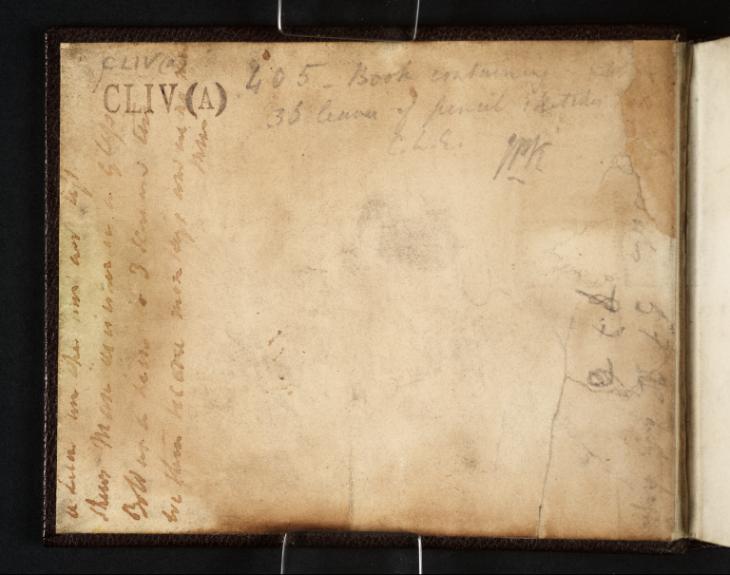This page is not listed specifically in Finberg’s
Inventory of the Turner Bequest, although he does transcribe the Bequest executors’ endorsement with the book’s original schedule number,
1 by Charles Lock Eastlake, whose initials are followed by those of John Prescott Knight, in pencil along the top edge: ‘405. Book containing | 36 leaves of pencil sketches | C.L.E.
JPK’.
Turner had made separate inscriptions with the page turned vertically both ways, in pen from the outer edge and in pencil working from the gutter. The pen inscription comprises four lines, with a further word completing the stanza below the end of the last line:
A Lion an ape and an Ass
Shows Man as it were in a Glass
Bold as a Lion to 3 score and ten
We then become monkeys and are no more | men
The verse is a truncated version of an anonymous poem which has been published in various forms, and may be a traditional ‘Ages of Man’ folk song. The following text is from a Victorian anthology, which furnishes it with a title and subheadings:
Man.
An ape, a lion, a fox, and an ass
Resemble man’s life, as it were in a glass.
Apish they are until twenty-and-one;
Bold as a lion till forty is gone;
Cunning as foxes till threescore-and-ten;
They then become asses, and no more are men.
Woman.
A Dove, a sparrow, a parrot, a hen,
Resemble the life of a woman.
Gentle as doves until fourteen is o’er;
Loving as sparrows till thirty or more;
Prating as parrots till threescore-and-ten;–
They then become hens, and are no more women.
2A close variant of the above appeared in an 1824 anthology, published a few years after Turner’s datable use of this sketchbook, which omits ‘a hen’ and the whole of the last line.
3 There is a version ‘learned from a jolly mason, many years ago, to troll out to a fine Bacchanalian melody’ in
Notes and Queries from 1868, with significant differences in its coarser, more misogynist second verse:
A dove, a hen, a magpie, a crow,
Resemble the face of a woman also;
Harmless as doves till twenty-and-one,
Hatching like hens till forty be gone,
Chattering like magpies till three score and ten,
A crow’s an ill o
man [sic] – and so is a wo-man.
4There is no indication from Turner’s version whether he knew the second verse in any form. The rough and overwritten pencil inscription at the opposite end of the page reads, approximately:
[...]ls 572 [... ?high]
776
Matthew Imms
September 2013

